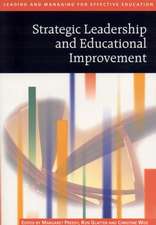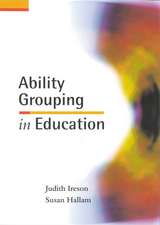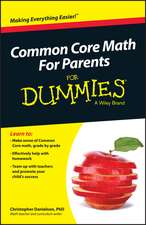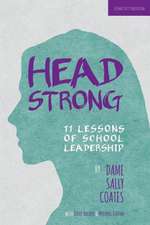The Action Research Guidebook: A Four-Stage Process for Educators and School Teams
Autor Richard D. Sagoren Limba Engleză Paperback – 18 ian 2011
1. Clarifying visions/targets
2. Articulating theory
3. Implementing action and collecting data 4. Reflecting on data and planning informed action.
The book includes numerous tables, charts, handouts, forms, and worksheets to demystify and simplify the action research process. Short examples drawn from the author's experience working on-one-on with teachers on their action research projects are also included – from raising reading proficiency to increasing the problem solving capacity of faculty members. Sagor shows how teacher teams can work collaboratively to identify and research problems related to the school's goals.
Appropriate for use by individual teachers and teacher teams, as well as by preservice teachers in teacher education courses. Headteachers, counsellors, and other educators will also find the action research process useful for school improvement.
Preț: 339.63 lei
Nou
Puncte Express: 509
Preț estimativ în valută:
64.99€ • 67.99$ • 53.99£
64.99€ • 67.99$ • 53.99£
Carte tipărită la comandă
Livrare economică 03-17 aprilie
Preluare comenzi: 021 569.72.76
Specificații
ISBN-13: 9781412981286
ISBN-10: 141298128X
Pagini: 248
Dimensiuni: 216 x 279 x 16 mm
Greutate: 0.69 kg
Ediția:Second Edition
Editura: SAGE Publications
Colecția Corwin
Locul publicării:Thousand Oaks, United States
ISBN-10: 141298128X
Pagini: 248
Dimensiuni: 216 x 279 x 16 mm
Greutate: 0.69 kg
Ediția:Second Edition
Editura: SAGE Publications
Colecția Corwin
Locul publicării:Thousand Oaks, United States
Recenzii
"This new edition is simply outstanding! The descriptions, metaphors, and modeling of an everyday approach to the inquiry cycle reflect Sagor’s deep understanding of the current challenges educators face in integrating action research into their practices."
"Richard Sagor is one of a very small group of academic educators writing today who authentically and profoundly bridges the gap between research and practice. His conception of action research, developed over decades of experience with thousands of educators, is clear, robust and flexible. This book is both intelligent and accessible, and is fun to read and use."
"Richard Sagor is one of a very small group of academic educators writing today who authentically and profoundly bridges the gap between research and practice. His conception of action research, developed over decades of experience with thousands of educators, is clear, robust and flexible. This book is both intelligent and accessible, and is fun to read and use."
Cuprins
Preface to the 2nd Edition
Publisher's Acknowledgments
About the Author
1. Introduction to Action Research
Why Conduct Action Research?
The Complexity of Routine Instructional Decisions
Key Terms and Concepts
Universal Student Success
2. Finding a Focus
Zeroing in on Your Priorities
Using Reflective Writing to Find a Focus
Performance, Process, and Program Targets and Action Research by School Leaders
Using a Journal to Identify Action Research Foci
Reflective Interviews
Reflective Interviewing and the Problem of Isolation
Analytic Discourse
Team Reflection
3. Refining the Focus
Visualizing Success
Doing an Instructional Postmortem
Taking Stock of One's Recent Leadership Experience
Comparing Your Experience With the Experience of Others
Developing Criteria to Measure Changes With Priority Achievement Targets
Creating Performance Rating Scales
Rating Scales and Program Action Research
The Special Problem of Long-Range Goals
Assessing Rate of Growth
Determining Adequate Yearly Progress in Real Time
Producing Your Own Rate-of-Growth Charts
Ascertaining Rate of Growth in Leadership Programs
4. Articulating a Theory of Action
If Not Us, Who?
An Adequate Knowledge Base Already Exists
Going Beyond Proven Practices: Building a Theory of Action
Two Kinds of Variables
Creating Mileposts on the Route to Mastery
Inferring Independent Variables
Using the Priority Pie to Identify, Clarify, and Weigh Independent Variables
Using the Priority Pie With Descriptive Research
5. Drawing a Theory of Action
Why a Map?
Building a Graphic Reconstruction
Graphic Reconstructions for Quasi-Experimental Research
Graphic Reconstructions With Descriptive Research
Proofing a Theory of Action-Leadership Projects
6. Determining the Research Questions
Three Generic Action Research Questions
Developing Your Own Research Questions
Two-Step Walk-Through
Drafting the Questions
Surfacing Research Questions for Leadership Projects
7. Building a Data-Collection Plan
Data Collection and the Competing Demands for Your Time
What Qualifies as Teaching?
What Qualifies as Data?
Data in Descriptive Research
Data in Quasi-Experimental Research
Data Collection and Concerns About Precision
Fishing in a Sea of Data
Securing Research Assistants
Building a Triangulated Data-Collection Plan
Data-Collection Planning for Leadership Projects
Integrating Efficiencies Into Your Data-Collection Work
Using Technology to Compile and Assemble Action Research Data
Keeping a Researcher's Journal
8. Analyzing the Data
Trend Analysis
Organizing Data to Help Answer the Three Generic Questions
ACR Question 1: What Did We Do?
ACR Question 2: What Changes Occurred Regarding the Achievement Targets?
ACR Question 3: What Was the Relationship Between Actions Taken and Any Changes in Performance on the Targets?
Drawing Tentative Assertions
Using Member Checking to Add Credibility to the Tentative Assertions
Additional Tools for Qualitative Data Analysis
Qualitative Data Analysis Using Bins and a Matrix
Low-Tech Strategies for Bins and Matrixes
Using a Computer for Bins and Matrixes
9. Turning Findings Into Action Plans
Modifying Your Theory of Action
Data-Based Decision Making
Turning Your Findings Into Ed Specs
Solicit and Brainstorm Action Alternatives
Using Ed Specs to Evaluate Action Alternatives
Using Ed Specs to Evaluate Action Alternatives for Schoolwide Projects
Completing the Cycle: Revised Theory of Action 2
10. Reporting and Sharing Action Research
Common Issues
Formats for Reporting
Creating a Bank of Abstracts
Creating a District Archive
11. Conclusion: The School as a Learning Organization
The Two Keys: Coherence and Congruence
Putting the Pieces Together
Resource A: How to Use the Feedback Forms and Summary Reports
Resource B: Five Characteristics of a Quality Action Research Project
Resource C: Applications for Leadership Projects
Glossary
References
Index
Publisher's Acknowledgments
About the Author
1. Introduction to Action Research
Why Conduct Action Research?
The Complexity of Routine Instructional Decisions
Key Terms and Concepts
Universal Student Success
2. Finding a Focus
Zeroing in on Your Priorities
Using Reflective Writing to Find a Focus
Performance, Process, and Program Targets and Action Research by School Leaders
Using a Journal to Identify Action Research Foci
Reflective Interviews
Reflective Interviewing and the Problem of Isolation
Analytic Discourse
Team Reflection
3. Refining the Focus
Visualizing Success
Doing an Instructional Postmortem
Taking Stock of One's Recent Leadership Experience
Comparing Your Experience With the Experience of Others
Developing Criteria to Measure Changes With Priority Achievement Targets
Creating Performance Rating Scales
Rating Scales and Program Action Research
The Special Problem of Long-Range Goals
Assessing Rate of Growth
Determining Adequate Yearly Progress in Real Time
Producing Your Own Rate-of-Growth Charts
Ascertaining Rate of Growth in Leadership Programs
4. Articulating a Theory of Action
If Not Us, Who?
An Adequate Knowledge Base Already Exists
Going Beyond Proven Practices: Building a Theory of Action
Two Kinds of Variables
Creating Mileposts on the Route to Mastery
Inferring Independent Variables
Using the Priority Pie to Identify, Clarify, and Weigh Independent Variables
Using the Priority Pie With Descriptive Research
5. Drawing a Theory of Action
Why a Map?
Building a Graphic Reconstruction
Graphic Reconstructions for Quasi-Experimental Research
Graphic Reconstructions With Descriptive Research
Proofing a Theory of Action-Leadership Projects
6. Determining the Research Questions
Three Generic Action Research Questions
Developing Your Own Research Questions
Two-Step Walk-Through
Drafting the Questions
Surfacing Research Questions for Leadership Projects
7. Building a Data-Collection Plan
Data Collection and the Competing Demands for Your Time
What Qualifies as Teaching?
What Qualifies as Data?
Data in Descriptive Research
Data in Quasi-Experimental Research
Data Collection and Concerns About Precision
Fishing in a Sea of Data
Securing Research Assistants
Building a Triangulated Data-Collection Plan
Data-Collection Planning for Leadership Projects
Integrating Efficiencies Into Your Data-Collection Work
Using Technology to Compile and Assemble Action Research Data
Keeping a Researcher's Journal
8. Analyzing the Data
Trend Analysis
Organizing Data to Help Answer the Three Generic Questions
ACR Question 1: What Did We Do?
ACR Question 2: What Changes Occurred Regarding the Achievement Targets?
ACR Question 3: What Was the Relationship Between Actions Taken and Any Changes in Performance on the Targets?
Drawing Tentative Assertions
Using Member Checking to Add Credibility to the Tentative Assertions
Additional Tools for Qualitative Data Analysis
Qualitative Data Analysis Using Bins and a Matrix
Low-Tech Strategies for Bins and Matrixes
Using a Computer for Bins and Matrixes
9. Turning Findings Into Action Plans
Modifying Your Theory of Action
Data-Based Decision Making
Turning Your Findings Into Ed Specs
Solicit and Brainstorm Action Alternatives
Using Ed Specs to Evaluate Action Alternatives
Using Ed Specs to Evaluate Action Alternatives for Schoolwide Projects
Completing the Cycle: Revised Theory of Action 2
10. Reporting and Sharing Action Research
Common Issues
Formats for Reporting
Creating a Bank of Abstracts
Creating a District Archive
11. Conclusion: The School as a Learning Organization
The Two Keys: Coherence and Congruence
Putting the Pieces Together
Resource A: How to Use the Feedback Forms and Summary Reports
Resource B: Five Characteristics of a Quality Action Research Project
Resource C: Applications for Leadership Projects
Glossary
References
Index
Notă biografică
Descriere
Bestselling author Richard Sagor's updated edition provides steps for effectively implementing research and data. The book is organized around Sagor's four-stage process and includes hands-on tools.









